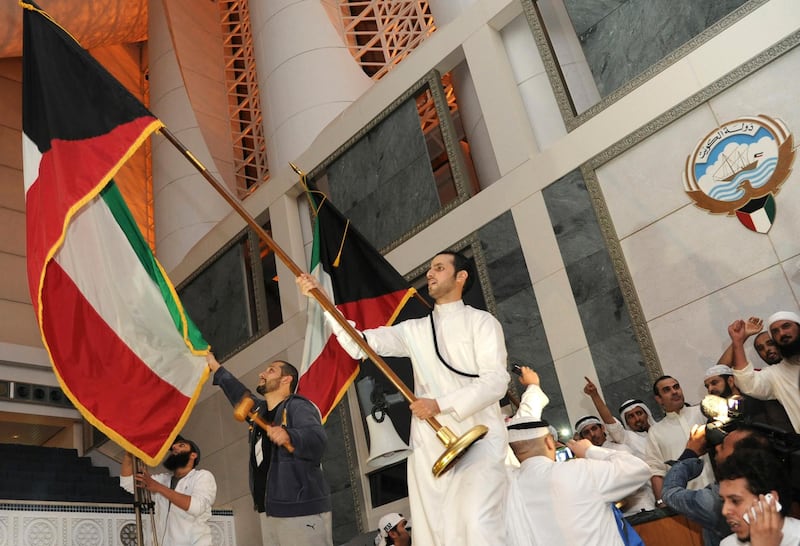Several Kuwaiti MPs are planning to seek pardons for politicians and activists sentenced to jail terms this week for storming parliament in 2011.
The parliamentarians met at opposition MP Mohammed Al Mutair’s diwan to form a committee to meet the “political leadership”, a term typically referring to the office of the emir of Kuwait.
The sentences were passed by Kuwait's highest court, whose rulings are final, and the emir is the only authority capable of pardoning those sentenced.
The court on Sunday sentenced five opposition activists and two serving and six former members of parliament to three and a half years in jail. Three other activists were sentenced to two-year prison terms, while another 34 people found guilty had their sentences dropped. Seventeen of the accused were acquitted.
Among those sentenced was Musallam Al Barrack, who served six consecutive terms in parliament and is considered by many to be the leader of the opposition movement. He had been sentenced to five years in prison for insulting the emir in 2012.
_____________
Read more:
[ Kuwait government resigns, state news agency reports ]
[ Kuwait MP: anti-corruption committee 'silly' in face of pressing problems ]
_____________
The storming of Kuwait’s National Assembly building in November 2011 came amid calls for the resignation of the then prime minister, Sheikh Nasser Al Mohammed Al Sabah. The protesters sang the national anthem in the main chamber of parliament and left shortly afterwards.
Although staging protests is legal in Kuwait, the courts found those sentenced to have broken several laws, including illegal entry into the National Assembly.
The accused in case, which has been bogged down in Kuwait’s complex legal system, were found guilty in January and sentenced to 7-year prison terms. They were released on bail pending an appeal to the Court of Cassation, which cut their jail terms by half in its ruling on June 8.
Some current members of parliament said those sentenced should be grateful for receiving reduced sentences.
“They caught a break - several of the current MPs are still calling for more action to be taken against them. They know they are accused of more than just storming the parliament. We’ll get to the bottom,” said a source close to the MPs.
The case has become a launching point for some MPs to question Kuwait’s political climate and to call for members of the parliaments elected in 2009 and 2012 to be held accountable.
“I am not with the action of entering the parliament but I am shocked at case of the deposits, which found 13 members of parliament receiving millions of dinars from unknown sources,” said Riyadh Al Adsani.
Although the MP did not name those accused of accepting sums ranging from 800,000 Kuwaiti dinars (Dh9.7 million) to KD9m, he said that the law should be applied to all from that time.
Mr Al Adsani said the public prosecution shelved the case, which he worked on as part of a parliamentary panel in 2012, but pursued the case related to the storming of parliament.
He said the case should be revived so that corrupt MPs “who walk around freely are punished”.
He said some of those who received deposits, believed to be bribes, were current members of parliament.
“Some said they would sue me, but they couldn’t because they know I am right and I have all the details to prove it,” Mr Al Adsani said.





